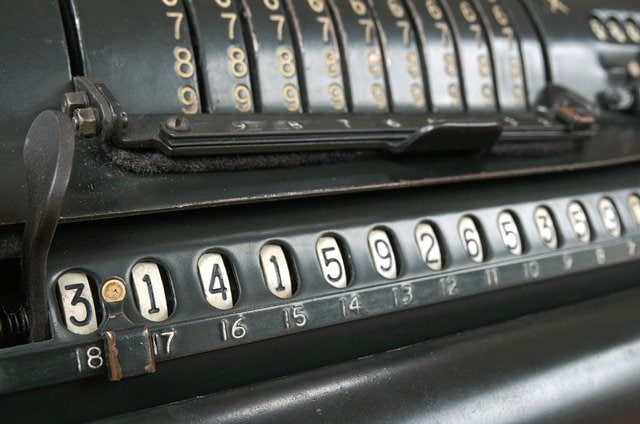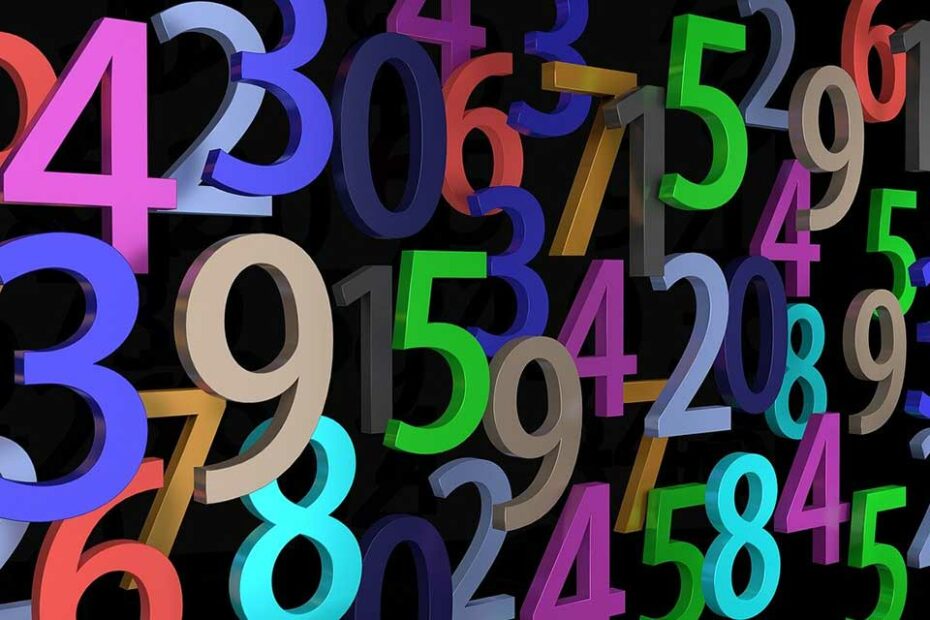How do you write cardinal numbers in German? And what are cardinal numbers anyway?
In linguistics cardinal numbers describe the words used for finite numbers. Or – for you and me – the numbers we use for counting something. You know, one car, two apples, six eggs and so on.
For mathematicians cardinal numbers are a generalization of naturals numbers to measure the cardinality of a set. Well, yeah. Basically the same, I assume.
However, when you are learning how to count, you will learn the digits as well as the words.
One stands for 1, two is used for 2, three for 3 and so forth.
But people didn’t always use the same notation. One system still in use today are the Roman numerals. When you watch a Hollywood blockbuster and make it to the end, you can often see the year the movie was made represented in roman numerals. Roman numerals are also still used in certain areas in natural sciences, music or history.
The ten digits we use today are called the Arabic numerals. The system is also called the Hindu–Arabic numeral system, as the first form was developed in India. The Indians used other digits though.
But how do Germans write their numbers? Well, the ten digits are the same. But some of the rules and regulations how to write them differ slightly.
Table of Contents
- Comma and Full Stop in German Numerals
- Capitalization of Numbers in German
- Ten’s and one’s place – let’s mix it up a bit
- Cardinal Numbers in German — 1 – 19
- Cardinal Numbers in German — 20 – 99
- Cardinal Numbers in German — >= 100
- Million, Billion and Trillion in German
Comma and Full Stop in German Numerals
In the German language, the comma and the full stop are used vice versa in-between digits. So in English you would write
Pi = 3.14159…
But in German it’s
Pi = 3,14159…
And to make it easier to read larger numbers, in English you use the comma.
One million = 1,000,000
But in German you use the full stop
One million = 1.000.000
Capitalization of Numbers in German
One of the main authorities on the German language, a dictionary called Duden (after it’s inventor, a man named Konrad Duden), has these rules on capitalization of cardinal numbers in German:
Numbers written as a word start with a small letter.
Only numbers equal to or bigger than a million are capitalized.
Numbers are also capitalized when you use them to describe a digit in text form.
An example:
On the hood of his racing car flaunted a large eight.
Auf der Motorhaube seines Rennwagens prangte eine große Acht.
Also, German cardinal numbers are usually written as one word.
Although something like “einhundertsiebenundachtzigtausenddreihundertsechsunddreißig” looks a bit unwieldy, to say the least.
Fortunately enough, even Germans know some limits!
As soon as you cross the million, the cardinal is split up in separate words.
So 3,156,675 becomes “drei Millionen einhundertsechsundfünfzigsechshundertfünfundsiebzig”.
Now, that’s much more readable, isn’t it?

Image by Andrew Martin from Pixabay.
Ten’s and one’s place – let’s mix it up a bit
Before we go on to the specific words used for cardinal numbers in German, there’s one more issue. Despite all their logic and otherwise so rational way of thinking, Germans have a strange way of combining the ten’s and one’s in a number into a word.
In the English language the highest digit comes first, followed by the second highest and so forth.
So, 21 is twenty-one, 347 is threehundred-fourty-seven.
But Germans use a different order for the numbers 21-99.
So, 21 isn’t “zwanzigundeins”, but is “einundzwanzig” instead. Equally, 347 becomes “dreihundertsiebenundvierzig”. This swapping of the order of digits is also true when you use the same form for higher numbers. So 347,000 is “dreihundertsiebenundvierzigtausend”.
Which makes sense, because using two different orders depending on the value would make matters even more complicated. Once you get used to it, the system isn’t all that hard. But when you first start learning it, you may feel a bit confused occasionally.
Cardinal Numbers in German — 1 – 19
| Number | German Word |
|---|---|
| 1 | eins |
| 2 | zwei |
| 3 | drei |
| 4 | vier |
| 5 | fünf |
| 6 | sechs |
| 7 | sieben |
| 8 | acht |
| 9 | neun |
| 10 | zehn |
| 11 | elf |
| 12 | zwölf |
| 13 | dreizehn |
| 14 | vierzehn |
| 15 | fünfzehn |
| 16 | sechzehn |
| 17 | siebzehn |
| 18 | achtzehn |
| 19 | neunzehn |
Cardinal Numbers in German — 20 – 99
| Number | German Word |
|---|---|
| 20 | zwanzig |
| 21 | einundzwanzig |
| 22 | zweiundzwanzig |
| 23 | dreiundzwanzig |
| 24 | vierundzwanzig |
| 25 | fünfundzwanzig |
| 26 | sechsundzwanzig |
| 27 | siebenundzwanzig |
| 28 | achtundzwanzig |
| 29 | neunundzwanzig |
| 30 | dreißig |
| 31 | einunddreißig |
| 32 – 39 | repeat the pattern above |
| 40 | vierzig |
| 50 | fünfzig |
| 60 | sechzig |
| 70 | siebzig |
| 80 | achtzig |
| 90 | neunzig |
| 99 | neunundneunzig |
Cardinal Numbers in German — >= 100
| Number | German Word |
|---|---|
| 100 | einhundert |
| 101 | einhunderteins |
| 102 | einhundertzwei |
| 103 | einhundertdrei |
| 104 | einhundertvier |
| 105 | einhundertfünf |
| 106 | einhundertsechs |
| 107 | einhundertsieben |
| 108 | einhundertacht |
| 109 | einhundertneun |
| 110 | einhundertzehn |
| 111 | einhundertelf |
| 112 | einhundertzwölf |
| 113-199 | pattern repeated as above |
| 200 | zweihundert |
| 300 | dreihundert |
| 400-900 | pattern repeated as above |
| 1000 | eintausend |
| 2000 | zweitausend |
| 3000 | dreitausend |
| 4000-9000 | pattern repeated as above |
| 10,000 | zehntausend |
| 100,000 | hunderttausend |
| 1,000,000 | eine Million |
| 2,000,000 | zwei Millionen |
| 10,000,000 | zehn Millionen |
Million, Billion and Trillion in German
There’s one last thing we have to look at. It’s the very high numbers. Although it’s very unlikely you or me will ever be a billionaire, it’s even harder to be one in Germany. Why is that so?
Because a billion in German means a different number than in English. And to make matters worse, there are more numeral words describing different powers of ten.
| English Number | English Cardinal | German Number | German Cardinal |
|---|---|---|---|
| 1,000,000 | Million | 1.000.000 | Million |
| 1,000,000,000 | Billion | 1.000.000.000 | Milliarde |
| 1,000,000,000,000 | Trillion | 1.000.000.000.000 | Billion |
| 10^15 | Quadrillion | 10^15 | Billiarde |
| 10^18 | Quintillion | 10^18 | Trillion |
So, as you can see, instead of going up with billion, trillion, quadrillion and so forth, Germans insert a -arde (Milliarde, Billiarde, Trilliarde…) when the decimal power is uneven (10^9, 10^15, 10^21…).
These words, which are spelled exactly the same, but have different meanings in two languages, are sometimes referred to as Fauxamis, false friends.
Regarding the large numbers in English and German, I’m not sure as to when and why these differences developed.
Because in British English there also used to be a “milliard” and a “billion” meant 10^12. But nowadays the American version seems to be the more popular one, even in Britain.
If you have more insights on this matter, please let us know in the comments.
And in case you aren’t fed up with numbers by now, you might want to take a look at our article on ordinal numbers in German as well.




